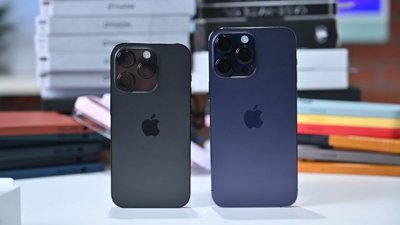Verizon, Sprint pass on iTunes phone
Most major wireless companies, including Verizon Wireless and Sprint, have reportedly balked at carrying the iTunes phone Apple has been codeveloping with Motorola.
"They figure they can charge a premium for the convenience of getting songs anytime, even though customers most likely won't be able to listen to those songs anywhere but on their phones, at least initially," wrote Business Week's Roger Crockett. He cites a source close to Apple who says wireless operators are "simply being unrealistic" if they expect customers to pay $2 or $3 for a song, especially with restrictions.
Instead the operators want customers to download songs over the air, directly to handsets. But the iTunes phone would allow customers to download songs to a PC or Mac and then copy them to the phone. "It's hard for people in any industry to support something that cuts them out of potential future revenue streams," said Graeme Ferguson, director for global content development at Vodafone Group PLC.
Still, Motorola told Business Week it expects at least one carrier will begin selling the iTunes phone this summer. With Verizon, Sprint and Cingular protesting Apple's distribution model, the remaining US-based major wireless carriers include Nextel and T-Mobile. Of the two, insiders believe the latter is the most likely candidate to adopt the phone and drive its customers to iTunes rather than build its own music store.
But is this an immediate concern for Apple? It could be. According to the article, the telecom approach has several strengths Apple can't match. "For starters, a quarter of the world's population already has a mobile phone. That's 1.4 billion people, compared with 10 million iPods sold to date. Most of those cell-phone toters pay a monthly phone bill, making it a snap to add a music charge. Perhaps most important, wireless technology could provide access anytime, anywhere to millions of songs."
Research firm Strategy Analytics estimates that in 2008 half of the 860 million cell phones sold will be able to store and play songs, compared to about 8% today.
Already technological advances in storage, compression, battery life, and wireless networks are making it easier to receive and store high-quality music on phones. The Business Week article notes that Korea's Samsung Electronics just introduced a phone with a 3-gigabyte hard drive, enough to store 1,000 songs, and says a 10GB phone could hit the market "within two years."
Meanwhile, International wireless operators are already providing a sense of what's possible at the edge of the digital music frontier. Says Crockett, "Korea's SK Telecom Co. offers a $5 a month music subscription that allows customers to download any of 700,000 songs to a phone, PC, or music player. That makes the subscription much more convenient than similar services in the U.S. because Korean customers can get any song they want, wherever and whenever they want it." Since its launch in November, a reported 300,000 people have signed up. "We are not yet making money, but we see a big potential for profits from music," said Shin Won Soo, a senior manager in charge of SK Telecom's music business. His company is expected to exit the red by the time it hits 800,000 subscribers. "That conjures up the possibility that with music phones, consumers around the world could opt to pay a monthly fee for all the new music they desire, rather than buying individual CDs when they debut."
Wireless operators in the US have to look no further than ringtones to know the proof is in the pudding. According to Business Week, these song snippets which go for $1 to $3 per download have evolved into a $5.8 billion business that is expected to reach $9.4 billion in 2008.
"Because [wireless companies] bill mobile customers each month, they wouldn't have to pay credit-card charges to Visa or MasterCard. That's not much of an edge over iTunes when customers buy a $9.99 album," wrote Crockett. "But if they buy single songs for 99 cents at iTunes, the fees total a significant 17 cents to 20 cents. Bottom line: Verizon, Cingular, and Sprint could end up lowering their prices to $1 a song and still make more profit than Apple does."
 Kasper Jade and Katie Marsal
Kasper Jade and Katie Marsal










 Malcolm Owen
Malcolm Owen
 William Gallagher
William Gallagher
 Mike Wuerthele
Mike Wuerthele
 Christine McKee
Christine McKee

 Andrew Orr
Andrew Orr
 Sponsored Content
Sponsored Content








